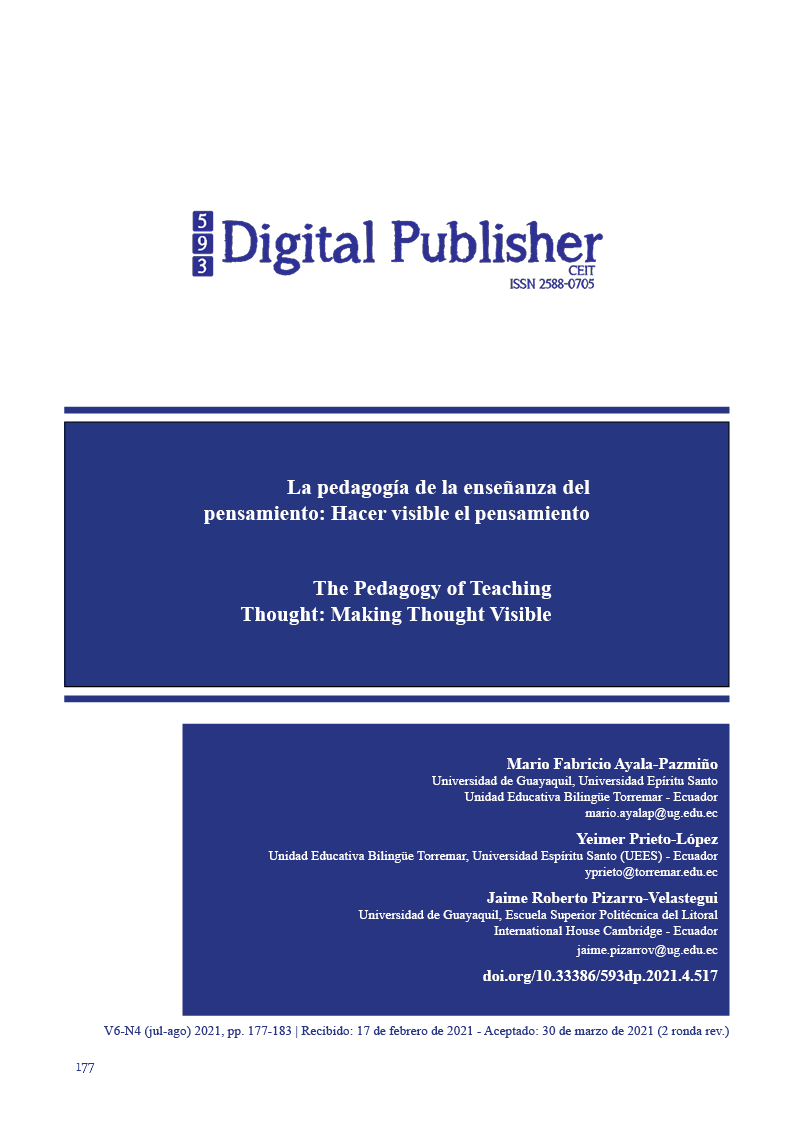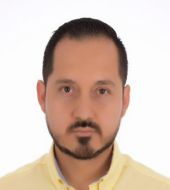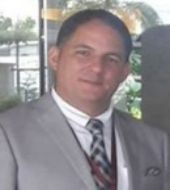The Pedagogy of Teaching Thought: Making Thought Visible
Main Article Content
Abstract
The main objective of this research is to theoretically systematize thinking routines and their influence on visible and critical thinking for the formation of investigative competencies. For its development, a qualitative approach has prevailed, and the application of scientific methods, such as the historical-logical for the determination of the main theoretical and methodological foundations, antecedents, concepts, and definitions of research. Theoretical systematization and holistic methods were also used.
The antecedents that support the research are provided as part of the theoretical scientific article and the thinking routines related to visible and critical thinking stimulation. The interviews with experts made it possible to prepare the proposal to provide a solution to the scientific problem associated with the limitations manifested in students in the training and stimulation of thinking routines and a better theoretical and factual treatment.
Downloads
Article Details

This work is licensed under a Creative Commons Attribution-NonCommercial-ShareAlike 4.0 International License.
1. Derechos de autor
Las obras que se publican en 593 Digital Publisher CEIT están sujetas a los siguientes términos:
1.1. 593 Digital Publisher CEIT, conserva los derechos patrimoniales (copyright) de las obras publicadas, favorece y permite la reutilización de las mismas bajo la licencia Licencia Creative Commons 4.0 de Reconocimiento-NoComercial-CompartirIgual 4.0, por lo cual se pueden copiar, usar, difundir, transmitir y exponer públicamente, siempre que:
1.1.a. Se cite la autoría y fuente original de su publicación (revista, editorial, URL).
1.1.b. No se usen para fines comerciales u onerosos.
1.1.c. Se mencione la existencia y especificaciones de esta licencia de uso.
References
Ajjawi, R. & Higgs, J. (2008). Learning to reason: a journey of professional socialization. Advances in Health Science Education, 13(2), 133-150. 10.1007/s10459-006-9032-4.
Andersen, G.G. (2018). Teacher perceptions of a culture of thinking. Advanced Education Programs Faculty Publications, 3, https://scholars.fhsu.edu/aep_facpubs/3.
Braun, J.D., Strunk, D.R., Sasso, K.E., & Cooper, A.A. (2015). Therapist use of Socratic questioning predicts session-to-session symptom change in cognitive therapy for depression. Behaviour Research & Therapy, 70, 32-37. https://doi.org/10.1016/j.brat.2015.05.004.
Burbules, N. (1993). Dialogue in teaching: Theory and practice. New York, NY: Teachers College Press.
Chappell, P. (2016). Creativity through inquiry dialogue. In R.H. Jones & J.C. Richards (Eds.). Creativity in language teaching: Perspectives from research and practice. Routledge. (pp.130-146).
Dajani, M.M.J. (2016). Using thinking routines as a pedagogy for teaching English as a second language in Palestine. Journal of Educational Research and Practice, 6(1), 1-18. 10.5590/JERAP.2016.06.1.01.
Delany, C., Golding, C. (2014). Teaching clinical reasoning by making thinking visible: an action research project with allied health clinical educators. BMC Med Educ, 14, 20. https://doi.org/10.1186/1472-6920-14-20.
Golding, C. (2011). Educating for critical thinking: thought‐encouraging questions in a community of inquiry. Higher Education Research & Development, 30(3), 357-370. 10.1080/07294360.2010.499144
Goodman, J.R. & Oglan, V.A. (2017). Making the invisible visible: Creating and fostering a classroom culture of thinking. SCAMLE Journal, 47-53. https://d1wqtxts1xzle7.cloudfront.net/54130966/099b858d361f620bd5c05bbdea2ff87f-with-cover-page-v2.pdf?Expires=1624425985&Signature=gMKQ-tKhECRNLGU-MoB6Back1qayHtkgqRqKoH3lyCB7vVm168QvUCXRAKf73974vgs1YIuz5hpISR4aYOYZD5TPr15fUlgKt~jvH35WwvubCPcJHNb0F8aIy39ZJmkdDOcoWAduw5Cd~lcI2gfsAIXMEl8GbyoCx1bjK~adq4gtuddTTQVg9J~MKB3I8Q5mBga16mxtEkA2HdPvaoLPp8knRHDQzbyiwqAzvENyxeu7HYhrRxKKaOsUwgaqUfxxdrwuePw~F0Ff~ibEhQApIFyZ5WoSYag9X00hoqizUFqFm35YaEz-ciG-CQLUDA4lz~71byf2kHubSLFBG2G7pA__&Key-Pair-Id=APKAJLOHF5GGSLRBV4ZA#page=48.
Linck, L.J., Wolberg, R.I., & Salmon, A.K. (2012). Creating a culture of thinking that cultivates the perspective-taking disposition. In M. S. Plakhotnik, S. M. Nielsen, & D. M. Pane (Eds.), Proceedings of the 11th Annual College of Education & GSN Research Conference (pp. 99-104). Miami: Florida International University. Retrieved from http://education.fiu.edu/research_conference/.
Nikijuluw, R.C.G.V. & Puspitasari, D. (2018). The influence of plus, minus, and interesting (PMI) strategy towards students’ speaking ability in an Indonesian private secondary school. International Journal of Language Education, 2(2), 113-121. https://files.eric.ed.gov/fulltext/EJ1245033.pdf.
Paul, R. (1993). Critical thinking: What every person needs to survive in a rapidly changing world. Rohnert Park, CA: Center for Critical Thinking and Moral Critique, Sonoma State University
Peterson, J.J. (2021). Visible thinking: A distributed cognitive process to self-manage cognitive load. United States Army Research Institute for the Behavioral and Social Sciences. https://apps.dtic.mil/sti/pdfs/AD1124593.pdf.
Perkins, D., Tishman, S., Jay, E. (2018). A classroom for thinking: Learning and teaching in a culture of thought. Buenos Aires. Aique.
Pinedo, R., Garcia, N., & Cañas, M. (2018). Thinking routines across different subjects and education levels. Proceedings of INTED2018 Conference, 5577-5580. https://www.researchgate.net/profile/Ruth-Pinedo/publication/323826530_Thinking_routines_across_different_subjects_and_educational_levels/links/5aacc5c1a6fdcc1bc0b8f35a/Thinking-routines-across-different-subjects-and-educational-levels.pdf.
Reznitskaya, A. & Gregory, M. (2013). Student thought and classroom language: Examining the mechanisms of change in dialogic teaching. Educational Psychologist, 48(2), 114-133. 10.1080/00461520.2013.775898
Ritchhart, R., Church, M., & Morrison, K. (2011). Making thinking visible: How to promote engagement, understanding, independence for all learners. California: Jossey-Bass.
Ritchhart, R., Church, M., Morrison, K. (2014). Make the thought visible. Buenos Aires: Paidós. Internet Visible Thought. http://www.pz.gse.harvard.edu/visible_thinking.php.
Ritchhart, R. (2015). Creating cultures of thinking. The 8 forces we must master to truly transform our
schools. California: Jossey-Bass.
Sahamid, H. (2016). Developing critical thinking through Socratic Questioning: An Action Research Study. International Journal of Education & Literacy Studies, 4(3), 62-72, http://dx.doi.org/10.7575/aiac.ijels.v.4n.3p.62.
Wells, C.L. & Sprott, R.A. (2020). Oil-land: An investigation into inquiry, dialogue, and action. Journal of Curriculum and Pedagogy, https://doi.org/10.1080/15505170.2020.1793436.




